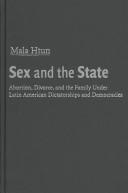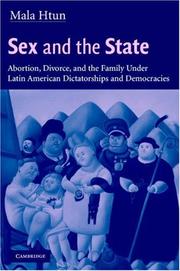| Listing 1 - 3 of 3 |
Sort by
|

ISBN: 0521810493 0521008794 0511615620 0511838018 Year: 2003 Publisher: Cambridge : Cambridge University Press,
Abstract | Keywords | Export | Availability | Bookmark
 Loading...
Loading...Choose an application
- Reference Manager
- EndNote
- RefWorks (Direct export to RefWorks)
Abortion, divorce, and the family: how did the state make policy decisions in these areas in Argentina, Brazil, and Chile during the last third of the twentieth century? As the three countries transitioned from democratic to authoritarian forms of government (and back), they confronted challenges posed by the rise of the feminist movement, social changes, and the power of the Catholic Church. The results were often surprising: women's rights were expanded under military dictatorships, divorce was legalized in authoritarian Brazil but not in democratic Chile, and no Latin American country changed its laws on abortion. Sex and the State explores these patterns of gender-related policy reform and shows how they mattered for the peoples of Latin America and for a broader understanding of the logic behind the state's role in shaping private lives and gender relations everywhere.
Family policy --- Sex role --- Politique familiale --- Rôle selon le sexe --- -Family policy --- -Sex role --- -Gender role --- Sex (Psychology) --- Sex differences (Psychology) --- Social role --- Gender expression --- Sexism --- Families --- Families and state --- State and families --- Public welfare --- Social security --- Social policy --- Government policy --- #A0507SO --- -#A0507SO --- Rôle selon le sexe --- Gender role --- Social Sciences --- Political Science --- Gender roles --- Gendered role --- Gendered roles --- Role, Gender --- Role, Gendered --- Role, Sex --- Roles, Gender --- Roles, Gendered --- Roles, Sex --- Sex roles

ISBN: 9780521008792 9780511615627 9780521810494 Year: 2003 Publisher: Cambridge Cambridge University Press
Abstract | Keywords | Export | Availability | Bookmark
 Loading...
Loading...Choose an application
- Reference Manager
- EndNote
- RefWorks (Direct export to RefWorks)
Book
Year: 2003 Publisher: Cambridge University Press
Abstract | Keywords | Export | Availability | Bookmark
 Loading...
Loading...Choose an application
- Reference Manager
- EndNote
- RefWorks (Direct export to RefWorks)
| Listing 1 - 3 of 3 |
Sort by
|

 Search
Search Feedback
Feedback About UniCat
About UniCat  Help
Help News
News